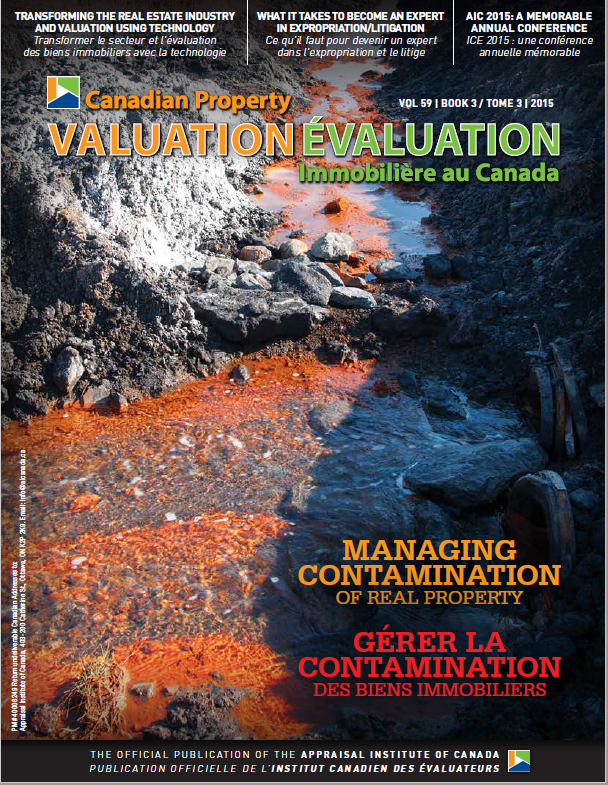Expert in Expropriation / Litigation
Canadian Property Valuation Magazine
Search the Library Online
Patricia L. Cooper, AACI, P.App is the owner of Outlook Realty Advisors Inc. in Calgary, AB. She has over 35 years of experience in the commercial real estate market in Calgary, having worked in senior management positions in municipal government, life insurance and trust company lending offices as well as in the appraisal profession. Pat is the current Chair of the Appraisal Institute of Canada (AIC) National Adjudicating Sub-committee and is a former member of the National Investigating Sub-committee. She has also held various positions on the Board of the Expropriation Association of Alberta.
Can you give us some background on your company and the work you do in the areas of expropriation/litigation?
Outlook Realty Advisors Inc. was formed in 1999 to provide specialized real estate appraisal and advisory services to select clients. We have always been a relatively small, local firm and, in 2012, I made the decision that we should be even smaller. I moved my office home and two other AACIs also chose to move to their homes and continue to work with Outlook. The move has served us well and we all enjoy the commute, although sometimes we complain about the housekeeping staff.
I have been involved in a number of appraisal assignments on properties that were expropriated or were under threat of expropriation and I have been engaged by landowners, their counsels or by the expropriating authorities. Many files are settled through negotiation, but others proceed to hearings at the Land Compensation Board. Similarly, parties to litigation may settle prior to a court date.
What have been your most interesting or memorable experiences working in this area?
One of my favorite experiences is getting the right answer, or close enough to it, so that the other side concedes more or less in accordance with my value estimate. It has only happened two or three times in my career, but it is a great feeling.
Similarly, receiving a judgment that supports my position is very satisfying. While it is not our job to be advocates, it is still nice to ‘win’ one for your client.
What role does an appraiser typically play in the expropriation/litigation process?
Generally, at least one or two appraisal reports are required as the file moves through negotiation and possible settlement. If the parties do not find a settlement, then expert reports may be exchanged. At this time, the appraiser may be requested to prepare a rebuttal report based on the expert report submitted by the other party.
The appraiser may be only one part of an expert team that includes planners, architects, business valuation experts, cost experts, etc. It is important that all the experts be aware of each other’s opinions to ensure that everyone understands the issues. Then, if the matter proceeds to a hearing or court, the appraiser may be required to provide expert advice to the court. It is important to be cognizant of the fact that the appraiser is there to advise the court, not to advocate for his or her client.
What knowledge or specific skill sets does an appraiser require to successfully do this type of work?
The most important skill for an appraiser engaged as an ‘expert’ is to be a thorough and careful researcher. Be sure you know the issues and the evidence, and that the interpretation of the evidence you are providing is, in fact, your opinion. Obviously, your clients may try to sway you toward their position, but that is not your job.
Your report must be succinct and accurate and assist the court in arriving at a reasonable conclusion. An appraiser engaged to provide expert witness testimony must prepare each appraisal report as though every word may have to be defended in court.
What are the biggest challenges that an appraiser faces in this area?
There are a couple of major challenges. The first is ensuring that your client and their counsel understand that you will provide an opinion that is your opinion and that you are not an advocate.
Another is to ensure that you are allowed to take the time needed to properly prepare at each stage. You will need to spend quite a bit of time preparing for a hearing and it is important that your client understand. You will want to be paid for that time.
Often, another challenge in expropriation files is that, if your client is the landowner and the expectation is that the expropriating authority will reimburse him/her for reasonable legal and appraisal fees, your client may expect you to wait for your fees to be recovered from the authority. Some of these files can go on for many years and an appraiser could end up sitting on receivables for a long time. You should discuss this with your client before taking on the assignment. Some expropriating authorities will pay appraisal costs on an interim basis or your client may be able to pay you and wait for reimbursement. At any rate, you should be aware of this going into the assignment.
Are there rewards or elements of job satisfaction that you can get from this type of work?
Any work that may involve expert witness testimony can be very stressful and challenging, but also very rewarding. Because appraisal work can sometimes feel like a solitary pursuit, I have enjoyed occasionally working as part of a team on an involved expropriation or litigation file. When a file is likely to go to a hearing, the job may involve many discussions with the client, their counsel, planners, accountants, architects and other experts. Preparation for the hearing means participating with all these interesting people and reading and understanding their reports. It is a great opportunity for networking as well as for learning new things.
You currently serve on the AIC’s National Adjudicating Sub-committee and have served in the past on the National Investigating Sub-committee. What are the most common mistakes you see appraisers making in situations involving expropriation/litigation?
The perception of conflict of interest is a big thing. Once one of the parties involved in litigation gets the idea, true or not, that his or her opponent and the appraiser are in cahoots, there is little chance that the appraiser will come out unscathed. Even the best appraisal report can be disputed if the other side thinks there was bias. If you are engaged by the brother of your second cousin’s ex wife in his bankruptcy proceeding, you might be accused of conflict of interest. Be certain to deal with any possible perception of bias before accepting the assignment. You are wise to pass on any assignment where you have even a remote personal interest.
Is there significant demand for appraisal services in this area?
There are a limited number of appraisers who want to engage in work that might involve becoming an expert witness and those who are willing to do the work and are good at it find themselves with lots of demand for their services. Where governments are undertaking major infrastructure projects, there is often a shortage of qualified appraisal experts. I know that right now there is strong demand in Edmonton, while new expropriation work in Calgary is more limited.
Remember that expropriation and litigation files may go on for several years while the parties negotiate, so you could have recurring work on the same file for a long time, perhaps eventually ending up in a hearing.
What advice would you give to appraisers looking to get into this type of work?
Recognize that this is a specialized field that requires extra effort on your part. Appraisals involved in litigation, including expropriation, must be undertaken more carefully and with a basic understanding of the law. Be prepared to spend more time on a report that you may have to defend in a hearing. Remember that the parties may be emotionally involved and that any errors or omissions in your report(s) can be costly for you and your client.
If someone is seeking more information on this subject, are there specific resources such as websites to which they can turn?
Most provinces have an expropriation association. Join. These associations have annual conferences that are well attended and very useful and they have websites. In Alberta, the annual conference has been held in Banff for many years. It provides an opportunity to meet landowners, expropriating authorities, lawyers who specialize in the field, and other appraisers and experts involved. The speakers are generally very interesting and topical.
Do you have any other thoughts that you would like to share?
I have learned so much by serving on the Investigating and Adjudicating Sub-committees. One of the best ways to improve your appraisal skills is to read reports and learn not to make the same mistakes as others. I encourage all appraisers to get involved and take on a volunteer position with the AIC. It is also rewarding to get to know colleagues from across the country and to discuss business and appraisal issues with others who are not competitors.






